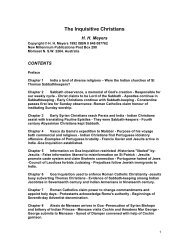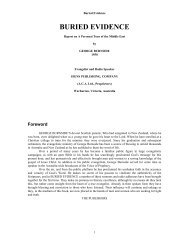Battle of the Bibles - Present Truth
Battle of the Bibles - Present Truth
Battle of the Bibles - Present Truth
You also want an ePaper? Increase the reach of your titles
YUMPU automatically turns print PDFs into web optimized ePapers that Google loves.
Chapter Twenty<br />
The Mercersburg Movement<br />
(And Its Influence On American Revision)<br />
The contagion <strong>of</strong> <strong>the</strong> Oxford Movement soon found victims in North America. Its<br />
contaminating <strong>the</strong>ories found ready acceptance among German "Reformationists" in<br />
Pennsylvania who were responsible for what came to be known as Mercersburg<br />
Theology. What Newman and <strong>the</strong> Oxford Movement were to Britain, so Dr Philip Schaff<br />
and <strong>the</strong> Mercersburg Movement came to be in America.<br />
Like Newman, Schaff was really an ardent Romanist. Both were traitors to<br />
Protestantism. In 1844 Dr Schaff arrived in Mercersburg, Pennsylvania, from <strong>the</strong><br />
University <strong>of</strong> Berlin, where as a pr<strong>of</strong>essing Protestant he had shown remarkable aptitude<br />
in accepting <strong>the</strong> Mystical Presence <strong>of</strong> Christ in <strong>the</strong> Lord's Supper. Dr Appel described<br />
him as<br />
"A gift from <strong>the</strong> fa<strong>the</strong>rland to <strong>the</strong> daughter Church on this side <strong>of</strong> <strong>the</strong> ocean<br />
/America]" (Appel, "Life <strong>of</strong> John W Nevin", pp 200, 201).<br />
In describing Schaff's penchant for Romanising, one Protestant Reviewer wrote:<br />
"Through <strong>the</strong> misty drapery <strong>of</strong> Dr Schaff's philosophy, every essential feature <strong>of</strong><br />
<strong>the</strong> papal system stands forth with a prominence so sharply defined, as to leave doubt<br />
impossible, and charity in despair" ("New Brunswick Review", p 23).<br />
The same magazine expressed <strong>the</strong> anxious concern that Protestantism in<br />
America was experiencing a repeat <strong>of</strong> what happened in England:<br />
"It is quite time that <strong>the</strong> churches <strong>of</strong> our country should awake to <strong>the</strong> extent and<br />
tendencies <strong>of</strong> this movement in <strong>the</strong> midst <strong>of</strong> American Protestantism. After a series <strong>of</strong><br />
advances and retractations, strongly resembling <strong>the</strong> tactics <strong>of</strong> <strong>the</strong> Tractarian party in<br />
England, we have at length a bold avowal <strong>of</strong> <strong>the</strong> primacy <strong>of</strong> Peter' <strong>the</strong> fundamental and<br />
test doctrine <strong>of</strong> <strong>the</strong> Papacy, followed by a concession <strong>of</strong> every vital point <strong>of</strong> Christianity -<br />
Church, Ministry, Worship, Sacraments, and <strong>the</strong> right <strong>of</strong> Private Judgment - to<br />
Romanism, and that too, while <strong>the</strong> name and <strong>the</strong> forms <strong>of</strong> Protestantism are (as far as<br />
possible) studiously retained" (ibid p 62).<br />
From <strong>the</strong> foregoing brief glimpse <strong>of</strong> Dr Schaff's philosophy, it is not hard to<br />
believe that, had his conscience been guided by <strong>the</strong> Christian ethic <strong>of</strong> honesty, he would<br />
have renounced all pretence <strong>of</strong> being a Protestant. On <strong>the</strong> contrary, he was seen by <strong>the</strong><br />
enemies <strong>of</strong> Bible-believing Protestants as <strong>the</strong> ideal counterpart <strong>of</strong> such people as<br />
Westcott, Hort and Ellicott who had foisted <strong>the</strong> fraud <strong>of</strong> Revision on <strong>the</strong> English-speaking<br />
world.<br />
Bishop Ellicott revealed <strong>the</strong> English involvement in <strong>the</strong> American Revision by<br />
requesting Dr Schaff to take <strong>the</strong> initiative in leading out in <strong>the</strong> formation <strong>of</strong> <strong>the</strong> American<br />
Revision Committee and <strong>the</strong>n its work. This he was quite happy to do. His predilection<br />
for a version that would please Roman Catholics is illustrated in his "Church History"<br />
where he translated Mat<strong>the</strong>w 16:18 in a way which would favour <strong>the</strong> apostle Peter as<br />
being <strong>the</strong> first pope. The New Brunswick Review commented on his audacity in this way:<br />
"Dr Schaff has laid his hand on <strong>the</strong> text itself. With unparalleled audacity he has<br />
translated Mat<strong>the</strong>w 16:18, 'thou art a rock,' and 'on this rock,' etc., as if 'Peter' and <strong>the</strong><br />
'rock' were expressed in <strong>the</strong> original by <strong>the</strong> same word. Bellarmine has not ventured to<br />
do this nor any o<strong>the</strong>r Romanist within our knowledge" (ibid May 1854 p 57). 17<br />
7





